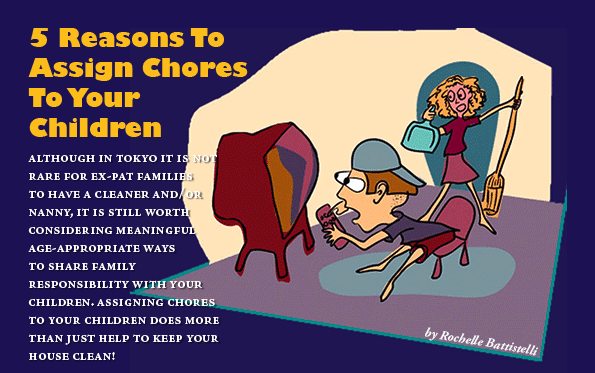1. Children who master the skills needed to complete a chore accurately learn to trust their competence.
2. When their contribution is genuinely appreciated, children experience a healthy sense of personal satisfaction.
3. Chores teach children practical skills that promote self-reliance.
4. Working together as a family can teach children valuable lessons about teamwork and relationships.
5. Assigning chores, overseeing them, and acknowledging your children’s contributions promotes the development of their positive self-esteem.
It’s rare to find a household that cannot use a little extra help with the housework, cooking, shopping or errands. Including your children in these chores can provide that extra bit of manpower but extra help is not the only or even the top reason for assigning your children chores.
Even in Tokyo where it is not rare for families to have a cleaner as well as a nanny it is well worth considering meaningful age appropriate ways to share family responsibility with your children.
We hope that our children will become capable, successful, adults with healthy self-esteems and good relationships. Assigning chores, overseeing them and acknowledging your child’s contribution to the family is a powerful way to turn that hope into reality. Children who master the skills needed to complete a chore accurately learn to trust their competence, they feel a sense of pride when their contribution is genuinely appreciated, they learn practical skills that promote self-reliance; all significant components of good self-esteem. Working together as a family can teach children valuable lessons about teamwork and relationships.
The sooner that you introduce chores the easier it will be for your children to accept them. By eighteen months when most children are mobile you can find ways for them to help. Introduce the idea of chores in a playful manner, don’t expect consistency in the beginning and focus on your child’s participation not the quality of the job. Start with a simple things like giving your toddler a damp cloth to help to wipe the high-chair tray after breakfast. Have a cloth for your child and a cloth for you and work together. (This is a good time to introduce a clean-up song.) Gradually let the child do most of the cleaning and expand the job to other meals.
Try to match the chore with your child’s interest, especially in the beginning. Preschoolers often love washing machines-make it their job to help you put clothes into the machine; if your child loves animals have them help with the family pet. Make sure that the chore is age appropriate and until your child is truly capable don’t expect perfection or even a particularly good job. The objective is to build character by allowing them to contribute to the family’s well being, not to toughen them up for the “real world” or “teach them a lesson”.
Children are less likely to complain and whine if the chores are logical and are genuinely useful. When children do whine about their chores try to ignore their protests and focus your attention on praising work well done. When they have a valid complaint let them know that you hear them and set a time to talk about it. Look for a solution that addresses the complaint but be wary of just abandoning the chore
With older children it is also important to realistically balance their chores with their other commitments like homework, sports practice and music lessons.
When children are old enough to need spending money some families pay an allowance based on jobs that a child does at home. Some families choose to keep allowances and chores separate reasoning that children deserve to have spending money and they should help at home. Whether you choose to relate an allowance to chores or to keep the two separate, introducing, supervising and acknowledging chores is an effective ways to teach your children responsibility, deepen family bonds and promote positive self image.

